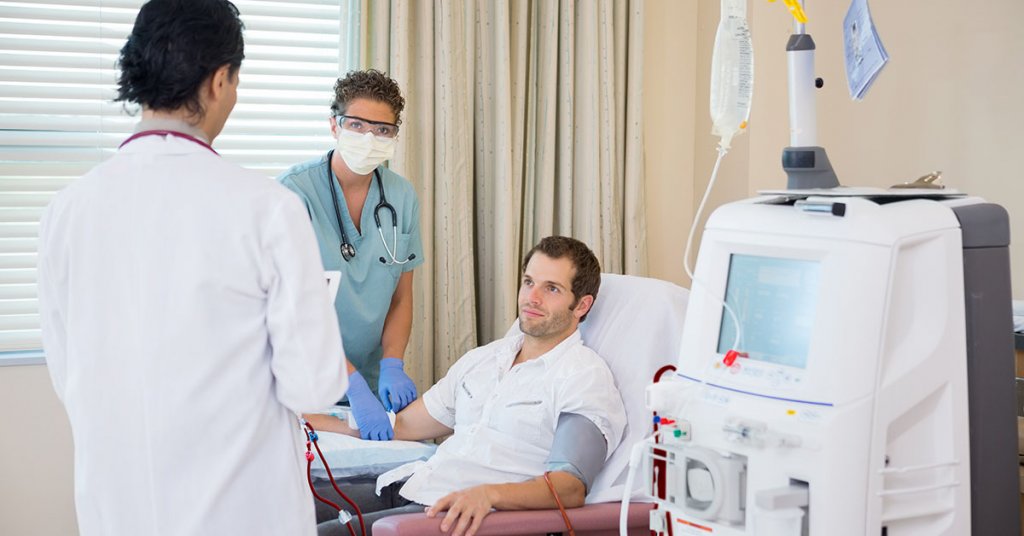8 Coping Tips for Dialysis Patients

According to the National Institute of Diabetes and Digestive and Kidney Diseases (NIDDK), around 468,000 Americans are on dialysis. Because it is a long-term treatment that can be time-consuming, beginning dialysis can be overwhelming. However, there are ways for dialysis patients to cope and adjust to their new normal.
1. Be an Active Part of Your Treatment Team
Dialysis patients should be an active part of their treatment plan. Being involved and learning as much as you will empower you to make the best decisions for your health. Staying in the know will help with your anxiety and fear about treatment. Keep track of what the doctors and nurses tell you by taking notes in a notebook or on your phone. Write down questions you have as you think of them so you can take them to your appointments. Involving your family, especially those you live with, can also be helpful.
2. Eat Well
It’s important that you stick to a dialysis diet. A dialysis dietician should be a part of your care team to teach you techniques for limiting your fluids while controlling thirst. They will also tell you which foods to avoid that are high in potassium, salt, and phosphorous. Learn which foods you can eat instead. You should get plenty of high-quality protein and other whole foods to help you feel energized.
3. Stay Active
Dialysis patients need to stay physically active. Talk to your doctor about what types of exercises are best for you to do and how much activity you should get. Exercise improves overall health and increases quality of life by helping fight fatigue and depression.
4. Get Enough Sleep
Sleep is essential for health, healing, and restoration. Dialysis patients should make an effort to get the recommended 7-9 hours of sleep each night. If you have sleep problems related to dialysis, talk to your doctor about what to do. Exercise can help many people with getting enough sleep, but you may need treatment for things like sleep apnea.
5. Monitor Your Mental Health
People with chronic health issues are vulnerable to things like depression. This is true of dialysis patients because treatment can cause big changes in daily life. You may have to give up certain activities you enjoy and your health is on your mind a lot. Check-in with yourself frequently to gauge your mood. You will probably be down some of the time, but learn the symptoms of clinical depression and seek help if you find yourself experiencing them. They include:
- Lack of interest in things you used to enjoy
- Mood changes
- Feelings of hopelessness
- Sleep changes
- Changes in appetite
- Fatigue
6. Stick to Your Routine As Much as Possible
Dialysis will interrupt your old routines, so it’s important for you to create a new one. Everyone benefits from having a routine for a sense of normalcy when they’re facing changes. Your new routine will have to be flexible, but make a good plan to guide you. Try and do as many normal activities as possible. Talk to your employer about how treatments will affect your schedule.
7. Make the Most of Dialysis Time
Dialysis treatments can be time-consuming. That’s why it’s important to try and make the most of that time if you can. Catch up on emails or work items if needed. Or take the time to try and relax and center yourself. Read a book or watch a show you’ve been looking forward to. Listen to your favorite music, podcasts, or guided meditations.
8. Seek Support
Stay connected to your family and friends. Being on dialysis can be full of ups and downs, so you will benefit from having people in your life to talk to and lean on. If you’re feeling overwhelmed, depressed, or isolated, find a counselor or dialysis support group. You should also communicate with your care team to let them know how you’re feeling. They can help with resources to keep you as healthy and positive as possible.
At Preferred Vascular Group, we provide comprehensive dialysis care for patients receiving hemodialysis for kidney disease. We are patient-centered and offer our patients hands-on-full-time care as a part of their treatment team.
If you would like to schedule an appointment at Preferred Vascular Group to have a consult with a board-certified physician or would like to have one of our highly-trained care providers reach out to you, please click on a button below:
